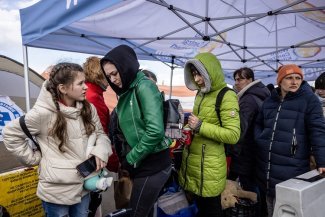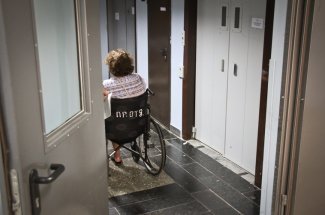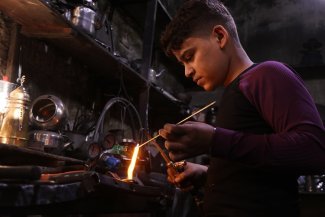In this 21 June 2022 photo, a childcare worker at the Lviv Children’s Shelter plays with one of the young boys in her care while two other children play on the floor.
Maryna Mykolayivna’s eyes are hot with tears. She stabs the air angrily with pointed fingers as she describes how on 24 February 2022, the day Russia invaded Ukraine, her employer at an orphanage in the eastern city of Lusychansk told her to immediately evacuate five children to another institution in Lviv – more than one thousand kilometres away.
“I didn’t want to go,” says the assistant educator. “I have two daughters and three grandchildren.” Maryna has been in the western city of Lviv, just 70 kilometres from the Polish border, for nearly eight months now. “I miss my home. I’m living in the orphanage 24 hours a day. I can’t rent my own place – I’m paid, but not enough. You couldn’t understand what I’m going through unless you’d gone through it yourself. I’m on the brink of leaving.”
As she speaks, the shrieking of children in the room intensifies. The group of 11 children aged three to eight years at the Lviv Children’s Shelter are stressed themselves. The state placed these children into institutional care after judging their parents unfit to care for them. They have already suffered domestic traumas; now they are living in a state of war.
Among them is another evacuated child, four-year-old Danylko (not his real name). His mother escaped with him from Kharkiv in the north-east of the country when shells began landing near their house. But police found her drunk on a bench in Lviv and brought Danylko to the orphanage. “Do you know my mama?” he asked us in a small voice when we arrived, and began to cry. He hasn’t seen her for three weeks. Instead of turning to Maryna, his carer, for comfort, he squeezed his arms around our Ukrainian translator’s neck. “I heard the shelling and firing. I was afraid,” he mumbled, twisting together his chubby fingers – his hands not yet dexterous enough to wring properly. “Something fell, and there were broken windows.”
Maryna does not reach out to him. Her own distress has limited her ability to support the children. In turn, Danylko has learned not to seek solace from her.
The situation for many child-focused workers in Ukraine, children and their parents or carers alike, is gruelling. In Lviv, where an estimated 240,000 Ukrainians have fled, services for children have come under increased pressure. Meanwhile the workers trying to deliver this provision are also coping with their own fears and personal losses.
Teachers and healthcare workers navigate stress and disruption
Ukrainian teachers began a new academic year on 1 September. About 51 per cent of schools and kindergartens across the country opened for in-person education. Schools in more dangerous territories, or those without adequate bomb shelters, deliver teaching online.
A survey of more than 300 teachers by the educator training programme Teach for Ukraine seen by Equal Times reveals that 76 per cent are worried about the increased responsibility they have for students. If air raid sirens go off during the day, teachers must evacuate their classes safely to designated shelters. Almost a fifth of teachers said psychological stress due to their personal circumstances was making them “unable to engage in their work”.
“Child-to-teacher interactions may be different and difficult now because of stress,” says Teach for Ukraine project manager and Ptashenya Kindergarten co-founder (a private daycare provider in the Lviv Region) Solomiya Boikovych. She says classrooms have a different dynamic now, as pupils have varying experiences of the war.
“Some may come from affected territories and others have lost relatives or parents,” she says. Online teaching is also challenging because it is harder to teach effectively through a screen, notes Boikovych. Meanwhile, teachers are dealing with their own traumas. “There are so many unpredictable things that might happen,” she says.
In Lviv, Maria Yatseyko, chair of the Lviv branch of the Trade Union of Education and Science Workers Of Ukraine, says that teachers are “not complaining” and “are trying to make it work”. She points out that many are continuing to teach online after seeing their schools damaged or destroyed by Russian missiles. As of 27 September, 2,260 educational institutions in the country have been damaged and 291 totally destroyed.
Yatseyko explains that over the school holidays Lviv Region educators worked tirelessly as volunteers to accommodate about 17,000 internally displaced people (IDPs) living in schools. They became cooks and counsellors. “We helped with everything, gave them advice, gave them clothing or shoes,” she says.
Healthcare workers face similarly challenging working conditions. In May, the World Health Organization said it had verified 200 attacks on healthcare facilities in Ukraine. As a result of this threat, Dr Zoryana Salabay, who manages a premature baby unit at Lviv’s regional hospital, relocated it to the basement. Newborns needing intensive care are too fragile to be moved when air raid sirens sound. “In ten days after the war began, we put oxygen downstairs, all the equipment, water, special ventilation…[.]” she says. “Right now, all of our babies, physicians and nurses are downstairs all the time so that it is safer for them.”
Conditions in the basement are cramped. In the post-intensive care room, 14 plastic cots line the walls. Their mothers, who sleep upstairs, spend the daytime standing over their babies in dressing gowns and slippers; there is only space for a few chairs. The air is stale and stuffy, despite the ventilator, and the glare of the strip lighting is intense. Hospital staff have blocked out any natural light from the room’s high windows with sandbags, in case of explosions.
“They are traumatised”
Among the mothers is Anastasiya (who did not give her surname). She fled from Kharkiv with her husband and two children after several weeks living in their cellar. “The shelling became unbearable,” she says. Anastasiya developed pregnancy complications at 30 weeks. Her daughter was born six weeks early via a traumatic caesarean section. She has survived respiratory problems and an infection but is still too weak to leave the hospital.
Anastasiya struggles to describe her feelings. “They go quiet,” says Salabay, referring to the mothers. “Our nurses listen to their stories,” she continues. “But it is also difficult for them to work in these inappropriate conditions, not just to help the babies, but also to support the mothers, the parents. They are traumatised.”
Her team does not have access to specific psychological support, but Salabay encourages colleagues to share their thoughts and feelings. “Some of them have husbands that are currently fighting in military operations in the east,” she adds.
Iryna Trokhym, director of the NGO Women’s Perspectives, says people supporting traumatised children and families are largely doing so without appropriate training. “Nobody has been preparing to provide services to people who are running from war,” she says. “Everybody is working with trauma now, but it’s hard to have those skills.”
Trokhym says efforts to support people’s psychological needs are made more challenging because Ukrainians are unused to accessing psychological support.
“A lot of women-focused NGOs from different parts of Ukraine say it is difficult to provide psychological support to women, because they don’t understand how it can help,” she says.
Trokhym says the best support psychologists can offer children is art therapy. “It’s very rare that a mother understands that a kid needs one-to-one psychological support, or direct counselling,” she says. “We mainly have to work in groups.”
Women’s Perspectives provides accommodation for IDPs. Among them is Iryna Lytvynova, a mother who fled from the city of Kramatorsk (which is in a part of Donetsk that has not been occupied by Russia) with her two children after living in their basement for a month. They left by train days before a deadly Russian missile strike hit Kramatorsk station on 8 April killing 60 civilians. Despite these shattering experiences, Lytvynova says speaking to a psychologist “wasn’t helpful”. “He’s fine,” she says of her two-year-old son. “We are hoping for peace so that we can get our lives back.”
Remarkable work
John R. Weisz, a professor at Harvard University in the Department of Psychology, says child-focused workers are providing “remarkable” help under extreme circumstances in Ukraine. He recently visited Ukrainian refugees in Poland, as part of an international team of psychologists investigating how to support the mental health of child refugees. “Some adults are experiencing a lot of emotional upheaval, but they are able to work with children in a way that doesn’t reveal that,” he says. “Other adults may find it very difficult to behave in a normal and helpful way because of what they’re going through.”
Weisz says the impact an adult’s own trauma will have on children in their care depends on how successfully they can overcome their feelings when with children. But points out that children also have a broad range of responses to trauma.
“Some are incredibly resilient,” he says. “Some kids develop symptoms of depression; others develop hyper-vigilance and more anxiety. One of the challenges will be significant numbers of kids who will have post-traumatic stress symptoms – flashbacks, memories that they would rather never relive – and we need interventions for those symptoms.”
Weisz backs Trokhym’s suggestion that there is little support among Ukrainian parents for psychotherapy. He suggests digital self-help services are the best solution, particularly as Ukrainians generally have good tech skills and internet access. The sheer number of people needing psychological support also means it is financially and practically possible to reach people in this way.
Online content can even help very young children, says Weisz. For example, he says episodes of the US kids show Sesame Street dubbed in Ukrainian are proving popular. “Moms from Ukraine want their kids to have something that’s entertaining and engaging and takes them away from thinking about the war,” he says.
At the orphanage, we manage to distract Danylko with some Lego. He smiles at the spaceship he has built and flies it around his head. But when he sees that we are leaving, he asks again solemnly: “Do you know my mama?”













